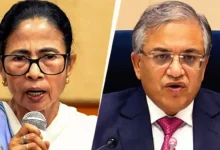
New Delhi: Financial experts remain split on how much the Reserve Bank of India should reduce interest rates when the Monetary Policy Committee concludes its two-day Mumbai meeting with an announcement on June 6.
The policy debate centers around whether India’s central bank should implement a moderate 25 basis point reduction or pursue a more substantial 50 basis point decrease to stimulate economic activity.
This disagreement reflects the current economic environment where consumer price inflation has dropped considerably below the 4 percent threshold, while domestic economic growth projections remain positive.
Nevertheless, factors including international monetary policy shifts, potential monsoon effects on agricultural prices, and foreign investment patterns continue to shape policy decisions.
Piramal Group’s Chief Economist Debopam Chaudhuri advocates for the larger reduction approach.
In his statement to ANI, Chaudhuri explained, “The committee should implement a more substantial 50 basis point decrease during this cycle. Interest rate transmission only gained momentum after the repo rate reached 6 percent in April, as previous restrictive liquidity had maintained high market rates. A 50-basis-point reduction could compensate for previous delays and provide greater economic stimulus.”
He emphasized favorable timing conditions, noting the anticipated US Federal Reserve policy adjustments.
“Given the expected US Fed rate reductions, worries about shrinking yield gaps between American and Indian markets should ease. Lower lending costs would boost domestic economic prospects and strengthen India’s investment attractiveness, independent of US debt spreads,” Chaudhuri added.
Conversely, Bank of Baroda Economics Specialist Sonal Badhan favors the smaller adjustment.
“Our forecast is for a 25-basis-point reduction this week. This projection stems from substantially moderated inflation that should remain controlled in upcoming periods. Additionally, normal monsoon forecasts suggest limited food price pressures,” she informed ANI.
Badhan indicated the RBI will likely lower its FY26 inflation estimates by approximately 10 basis points due to better Q1 performance. However, she dismissed prospects for the larger cut.
“We consider 50 basis points improbable as June’s reduction represents advance action. The RBI will exercise caution pending actual monsoon distribution patterns. Furthermore, with the US Fed expected to maintain current rates until September 2025, reduced interest differentials could affect foreign portfolio investments and rupee stability. Therefore, 25 basis points appears more reasonable,” she clarified.
Supporting an accommodative approach, M. Govind Rao, 14th Finance Commission Member and Karnataka Regional Imbalances Redressal Committee Chairman, sees opportunity for further policy easing.
“Inflation remains within target parameters, providing adequate space for rate reductions. Given uncertainties from tariff changes and global market instability, lowering interest rates appropriately would encourage increased investment,” he stated to ANI.
Market attention will focus on Governor Sanjay Malhotra’s Friday, June 6 announcement at 10 am following the committee’s conclusion.
With controlled inflation and emphasis on investment-driven expansion, the RBI must carefully balance growth encouragement against financial system stability.
(With ANI Inputs)




